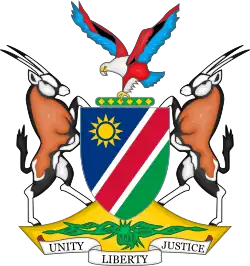Namibia–Turkey relations
Namibia–Turkey relations are the foreign relations between Namibia and Turkey. Turkey has an embassy in Windhoek since January 4, 2012.[1]
 | |
Namibia |
Turkey |
|---|---|
Diplomatic relations
Namibia’s struggle for independence from South Africa led to extensive Turkish diplomatic efforts as the co-sponsor[1] from the Western Contact Group and founding member of the UN Council for Namibia, that called for Namibian independence.
Namibia — or known as South West Africa before independence — was the last African colony.[2] South West Africa had been a German colony that was granted to South Africa under a League of Nations mandate in 1920, following Germany’s defeat in World War I.[2] The mandate forbade South Africa from annexing South West Africa but South Africa continued its rule even after UN General Assembly voted[3] to revoke the League of Nations mandate on August 26, 1966.[2]
Turkey continued to advocate on behalf of Namibia’s independence but many countries balked[3] at supporting the country’s movement under Sam Nujoma that allied with the Soviet Union and started sending young men to the Soviet Union for training in preparation for guerrilla warfare.[2] Guerrilla warfare began 1966 but was marginal until Communist-led MPLA took over Angola in 1975.[4] Nevertheless, South Africa succeeded in driving off the guerillas.[4]
The diplomatic breakthrough came with the election[5] of Jimmy Carter, who came to support[6] the Western Contact Group and worked to negotiate peace in Namibia.[6] In 1978 South Africa and Western Contact Group created a plan for holding elections that would lead to Namibian independence in 1990.
Economic relations
- Trade volume between the two countries was 11.8 million USD in 2018 (Turkish exports/imports: 9.40/2.44 million USD).[1]
References
- "Relations between Turkey and Namibia". Ministry of Foreign Affairs of Turkey.
- Leys, Colin, and John S. Saul, eds. Namibia’s Liberation Struggle: The Two- Edged Sword. London: James Currey, 1995.
- Duignan, Peter, and Lewis H. Gann. The United States and Africa: A History. New York: Cambridge University Press, 1987.
- Dickson, David. United States Foreign Policy towards Sub-Saharan Africa. Lanham, Md.: University Press of America, 1985.
- Crabb Jr., Cecil V. The Doctrines of American Foreign Policy: Their Meaning, Role, and Future. Baton Rouge: Louisiana State University Press, 1982.
- Thornton, Richard C., ed. The Carter Years: Toward a New Global Order. New York: Paragon House, 1991.
Further reading
- Bender, Gerald J., James S. Coleman, Richard Sklar, eds. African Crisis Areas and U.S. Foreign Policy. Berkeley: University of California Press, 1985.
- Birdsall, Nancy, Milan Vaishnave, and Robert L. Ayres, eds. Short of the Goal: U.S. Policy and Poorly Performing States. Washington, D.C.: Center for Global Development, 2001.
- Bodry-Sanders, Penelope. African Obsession: The Life and Legacy of Carl Akeley. Jacksonville, Fla.: Batax Museum Publishing, 1998.
- Brands, H.W. The Specter of Neutralism: The United States and the Emergence of the Third World, 1947–1960. New York: Columbia University Press, 1989.
- Brinkley, Douglas G. The Unfinished Presidency: Jimmy Carter’s Journey beyond the White House. New York: Viking, 1998.
- Chester, Edward W. Clash of Titans: Africa and U.S. Foreign Policy. Philadelphia, Pa.: Orbis Books, 1974. Clough, Michael. Free at Last? U.S. Policy toward Africa and the End of the Cold War. New York: Council on Foreign Relations Press, 1992.
- Crabb Jr., Cecil V. The Doctrines of American Foreign Policy: Their Meaning, Role, and Future. Baton Rouge: Louisiana State University Press, 1982.
- Dickson, David. United States Foreign Policy towards Sub-Saharan Africa. Lanham, Md.: University Press of America, 1985.
- Duignan, Peter, and Lewis H. Gann. The United States and Africa: A History. New York: Cambridge University Press, 1987.
- Engerman, David C., et al. Staging Growth: Modernization, Development, and the Global Cold War. Amherst: University of Massachusetts Press, 2003.
- Haass, Richard N, ed. Transatlantic Tensions: The United States, Europe, and Problem Countries. Washington, D.C.: Brookings Institution Press, 2009.
- Hahn, Peter L., and Mary Ann Heiss, eds. Empire and Revolution, The United States and the Third World since 1945. Columbus: Ohio State University Press, 2010.
- Herbst, Jeffrey. U.S. Economic Policy toward Africa. New York: Council on Foreign Relations Press, 2002.
- Karns, Margaret P. “Ad hoc Multilateral Diplomacy: The United States, the Contact Group, and Namibia.” International Organization 41, no. 1 (Winter 1987): pp. 93–123.
- Leys, Colin, and John S. Saul, eds. Namibia’s Liberation Struggle: The Two- Edged Sword. London: James Currey, 1995.
- Thornton, Richard C., ed. The Carter Years: Toward a New Global Order. New York: Paragon House, 1991.
- Vance, Cyrus R. Hard Choices: Critical Years in America’s Foreign Policy. New York: Simon & Schuster, 1983.
